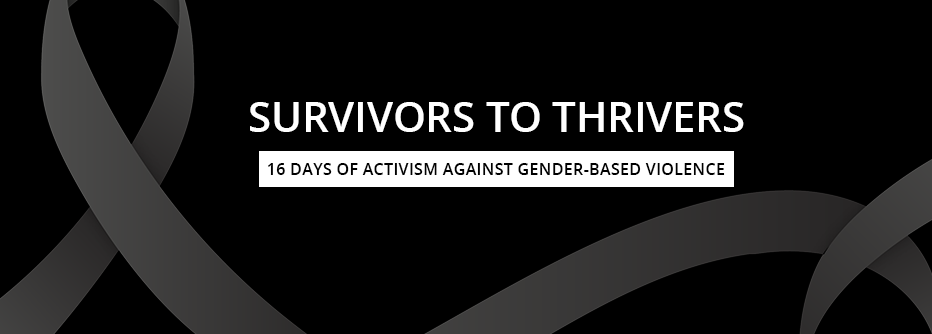
The 16 Days of Activism for No Violence Against Women and Children International Campaign takes place from 25 November to 10 December every year.
According to the United Nations (UN) there has been a global increase in domestic violence amid the Covid-19 health crisis. Calls to helplines for reporting violence against women increased up to fivefold in the first few weeks of the pandemic.
According to the World Health Organisation the Gender Based Violence (GBV) rate in South Africa is five times higher than the global average.
The North-West University (NWU) does not tolerate GBV, and is once again doing its part by creating awareness and sharing important information.
Michelle Bownes - NWU addresses GBV

With the gender-based violence (GBV) rate in South Africa being five times higher than the global average, the North-West University (NWU) is doing its part against GBV by creating awareness and offering support to those in need.
Earlier this year the Department of Higher Education and Training issued a GBV Policy Framework that all post-school education and training institutions must use to develop an internal GBV policy and procedure.
A task team that consists of various NWU representatives has drafted a GBV policy that will guide all stakeholders at the university in how to report, investigate, monitor, create awareness and address instances of GBV through a disciplinary or alternative dispute resolution process. Counselling will also be provided to victims of GBV by the Employee Wellness and Student Counselling departments.
According to Michelle Bownes, the senior employee relations specialist at the NWU Employee Relations and Wellness department and the task team coordinator, the high-level draft has served at the UMC for approval to serve at other governance committees and faculty boards for consideration, recommendation and approval.
She adds that, once all the inputs have been received, they will be consolidated and the final draft will serve at the NWU Refinement Committee. If the Refinement Committee is in agreement, the committee will make a recommendation to the UMC and Council for final approval and implementation.
As soon as the policy has been approved, a GBV standard operating procedure will be drafted by the task team.
“The university is committed to addressing instances of GBV and providing a safe environment for staff and students. The GBV policy as well as the standard operating procedure will be applicable to all staff and students,” says Michelle.
The policy will be finalised early 2021.
Prof Hayley Walker-Williams - Help is needed for victims

Over the past five months there have been numerous stories in the media about victims being harassed, attacked and even murdered by their intimate partners. According to Statistics SA, the incidence of gender-based violence (GBV) in South Africa is five times higher than the global average.
Prof Hayley Walker-Williams, the deputy director of the School of Psychosocial Health at the North-West University (NWU), gives insight into why GBV victims find it hard to leave these relationships and what can be done to help them.
Prof Hayley explains that GBV can be physical, sexual, emotional and financial, and can be perpetrated by intimate partners, acquaintances, strangers and institutions. Both men and women can be victims, but in most instances GBV is committed by men against women. The man perpetrating the violence is often known to the woman, for example a partner or family member.
Why do victims stay in abusive relationships?
Prof Hayley says that it is well documented that most women leave an abusive relationship four to seven times with varying degrees of permanency before they finally escape the perpetrator’s control. The fear of leaving is often far greater than the fear of staying.
The reason for this is that victims fear aggravating the abuser, which can result in them and their children getting hurt. Being socially, geographically, physically and financially isolated and having no access to resources that allow them to function independently from the perpetrator are further reasons for victims not leaving.
As GBV is shrouded in secrecy and stigma, the fear of being shamed or stigmatised for leaving also prevents victims from doing so. Furthermore, if the victim grew up in an abusive household, the repeated cycle of violence affects their self-belief and self-worth.
Prof Hayley adds that religious or cultural values also play a role in victims not leaving abusive relationships, because some religions and cultures forbid separation, divorce or going against the patriarchal leadership of the family.
Literature also reports that women have lost faith in the police services or justice system and may feel that no one will be able to protect them or their children.
What can be done?
GBV has devastating long-term effects on almost every aspect of the victim’s life. Victims tend to suffer from mental-health, inter- and intrapersonal and sexual difficulties.
The critical point of departure has to be to focus on healing the victim and neutralising the devastating long-term impact on the victim’s ability to live a normal life. Victims can be assisted if they are offered a legal approach that is empowering, compassionate and responsive to their needs. This can be done by mobilising resources and strengthening protective community resources.
To GBV victims the world can be lonely, isolated and riddled with fear. Family and friends need to offer victims support and ensure that they validate the victim’s feelings.
Prof Hayley states that victims who have suffered long-term abuse should create a safety plan that prepares for a safer exit from the relationship. Victims need to be offered support and resources. Family and friends can assist them to approach a social worker, psychologist, medical doctor, lawyer or even their human resources officer at work. Encourage them to seek out local trauma clinics at primary healthcare facilities, counselling services like LifeLine, or non-profit organisations such as People Opposing Women Abuse (POWA).
If GBV victims receive the necessary support, it will be easier for them to leave these toxic relationship
Tebello Mabusela - The importance of support

On average it takes a gender-based-violence victim seven attempts before they leave a toxic relationship. It becomes easier for a victim to sum up the courage to finally walk out – and stay away – when they receive support from family and friends.
Tebello Mabusela, a lecturer at the School of Psychosocial Health of the North-West University (NWU), speaks about the importance of support from family and friends when one is in a toxic relationship.
Tebello says that victims know that they are being ill-treated and abused, but tend to remain in these relationships for the sake of their children, a sense of belonging and financial support. They also stay because they have mastered the art of coping with the abuse and the abusive partner.
It is important that family members research and understand the reasons and factors why the victim does not leave the toxic relationship.
“Before you help someone leave an abusive relationship, make sure that you have prepared them externally and intrinsically for the change that is about to happen. Ensure that there are external resources that will help the victim function outside the relationship. These resources will help the victim to not go back to their abuser,” says Tebello.
According to Tebello, family and friends need to offer unconditional and non-judgemental support. They need to be there for the victim, and offer the victim practical advice such as calling the police, crisis centres, etc.
“Being helpful means being there, even if you told the victim 100 times that she needs to leave the abusive relationship. Being there means persevering and being patient with someone who seems to be ‘obsessed’ with the abuser. To them abuse is normal,” says Tebello.
Tebello emphasises that GBV victims need to seek counselling after leaving toxic relationships.
“Counselling will assist the victim to develop skills and internal resources to move on and be independent. Victims need to be reminded of what happiness looks like, and of self-love and self-care. Breaking the person from their own mental prison can be attained through therapy and through strength-based intervention by a healthcare professional,” says Tebello.
GBV helplines:
- National GBV helpline: 0800 150 150
- People Opposed to Women Abuse (Powa): 011 642 4345/ info@powa.co.za
- Families South Africa (Famsa): 011 975 7106/7
- Thuthuzela Care Centres (TCCs): 0800 428 428
- Tears Foundation: SMS helpline *134*7355# /info@tears.co.za
Dr Tertia Oosthuizen - Types of abuse

When gender-based violence (GBV) is spoken about, people assume that it refers to physical abuse, but that is not always the case. There are different ways abusers gain and maintain power and control over their partners.
Dr Tertia Oosthuizen from the School of Psychosocial Health at the North-West University (NWU) explains the various types of abuse that occur within a relationship and gives examples for each.
Physical abuse
This type of abuse takes place when victims are physically attacked and injured with the aim of inflicting harm. The perpetrator will use physical force to show their power over the victim by beating, strangling or burning them, or using objects to inflict the most serious damage or scarring the victim so that no one else will be interested in them. Brutal acts during sexual intercourse form part of this as well. The most severe form of physical abuse is when the perpetrator murders their victim.
Psychological/emotional abuse
This type of abuse is one of the most painful and can be described as the exploitation, manipulation, degradation, criticising and “mind-controlling” of the victim. The perpetrator will constantly lash out when things are not done according to their very specific wishes and demands. The perpetrator will severely degrade the victim by belittling, patronising, sneering at, being sarcastic to and breaking the victim down emotionally so that their self-image is damaged.
The victim becomes more submissive, and if they do not act according to the perpetrator’s orders, the perpetrator will start with physical abuse.
Economic or financial abuse
Gender inequality, if one partner is more successful than the other and the perpetrator feels that their status is being challenged or they are “losing power”, may lead to violent outbursts.
Financial abuse is also manifested when a partner decides how the income of both parties will be spent, and the victim has no say. Financial abuse perpetrators also tend to spend the household income on alcohol or unnecessary purchases.
Intimidation and isolation
The perpetrator expects the victim to be obedient at all times and therefore will decide when the victim can go out, who they can visit, when and where they are allowed to go. This abuse usually goes hand in hand with emotional blackmail and threats to harm the victim’s loved ones.
A serious form of intimidation and isolation is when they literally lock victim in the house in the evenings or over weekends.
Sexual abuse, including rape
In this instance, sex is about overpowering, humiliating and ensuring ownership of the victim.
Rape, which forms part of sexual abuse, is seen as the physical sexual act where the perpetrator will force themselves on the victim. Rape can take place within an intimate relationship or marriage where one of the partners has not agreed to sexual intercourse and the other partner just demands and “takes” it.
Pornography reduces the victim to being a sex object and someone who can be exploited in order to meet the needs of the person who is watching it. It promotes the belief that victims “play hard to get” and “like rough sex” and therefore abuse and physical hurt are imminent.
Spiritual abuse
Spiritual abuse is defined as abusing the sensitivity that someone has for Holy writings or for God by telling them that, no matter how severe the abuse they are exposed to, according to their religious beliefs, they have to stay obedient to the partner and not leave the relationship. People trust religious leaders and when they go to them with problems, this trust can be abused by not acknowledging the real pain of the victim.
Tumelo Muteme - Speaking out on abuse

With one in three women globally having experienced some sort of physical or sexual abuse, it is important to create awareness on gender-based violence.
Increased awareness on the matter can lead to changes in our society and legal framework.
Tumelo Muteme, a gender-based violence activist and a communication specialist at the North-West University (NWU), talks about how she survived three years of domestic violence. Tumelo openly speaks about her experience to motivate young people to leave relationships that are toxic and abusive.
Tell us about yourself
I was born and bred in Ekurhuleni. I kicked off my career as a journalist in 2011. I worked for a number of local newspapers and a national magazine for almost seven years. I met the father of my child and abuser in 2008. We were blessed with a little girl towards the end of 2011.
How long did you stay in the abusive relationship?
We were together for a total of seven years and the abuse started four years into the relationship. Unfortunately, I stayed for another three years before I finally left.
When did you realise that you were in an abusive relationship?
It is true when they say that if you partner hits you once, they will do it again. The father of my child slapped me for the first time six months after the birth of our daughter. I thought it was a once-off thing because it happened four years into the relationship.
After that first physical encounter it was downhill from there. I would get slapped, shoved and even kicked for anything under the sun. In 2013, as soon as I started reading more on domestic violence, I realised that I was being abused. And it was not normal.
How did you leave the relationship?
The fact that I was being physically abused was a secret. That is why it lasted so long. However, once I started speaking out to my family and friends, I realised I did not want to live like this anymore. I told him I no longer wanted a relationship with him, but he thought I was joking. When he realised I was serious he started stalking me. So I moved and went to live with my brother and I got a protection order against him.
Were the signs there from the beginning?
The signs were there from the beginning. He was very controlling and I mistook that for love.
What advice would you give victims who find themselves in this situation?
Most abusers do not change. Please – as soon as you realise that he is abusive, be it emotionally or physically, leave. The situation will only get worse.
Dr Goitseone Leburu - The relationship between GBV and HIV/Aids

The link between gender-based violence (GBV) and HIV/Aids is usually rooted in the power imbalance between men and women.
This was one of the findings of research conducted by Dr Goitseone Leburu, whose master’s and doctoral studies, both from the North-West University (NWU), revolved around different aspects of GBV.
Her master’s study, completed in 2015, explored the interconnectedness of GBV and HIV/Aids, and how the two social problems manifest, intersect and affect the lives of many women.
That study investigated the experiences of 30 women from registered non-governmental organisations that assist GBV victims and people living with HIV/Aids.
The role of power
Dr Goitseone’s research found that the power relations in these women’s past intimate relationships was extremely unequal. Most women stated that they were much younger than their partners and unemployed, which made them economically dependent.
When it came to women who earned an income, the study found that a number of them surrendered their decision-making power due to cultural pressure.
“The apparent cultural allegiance for the participants came at a price. Their culture silenced the discussions on topics involving sex, sexuality, GBV, the negotiation of condom use, the practice of safe sex and HIV/Aids,” Dr Goitseone says.
The study further revealed that all participants, together with other women in their communities, experienced various forms of abuse within their intimate relations but especially sexual violence. She adds that, consequently, women prefer to suffer in silence than expose their households’ “dirty violence linen in public”.
According to Dr Goitseone, sexual violence against women manifests in various communities and within families in the high prevalence of HIV/Aids. She also found that alcohol abuse is a major contributing factor to the spread of HIV/Aids and GBV.
Having established a link between GBV and HIV/Aids, Dr Goitseone went on to do her PhD at the NWU, focusing on how victims can be empowered. Her research was titled “Evaluating social work services within the Victim Empowerment Programme in addressing gender-based violence in North West Province”.
With 7,7 million people living with HIV in South Africa, and South African women being five times more likely to be killed by their intimate partner than women in other countries, the implications of these two interconnected social problems are enormous, highlighting the necessity for research such as Dr Goitseone’s.
